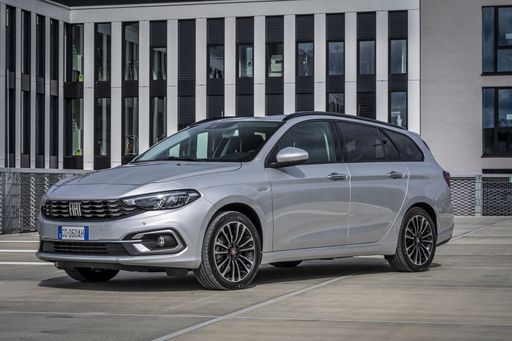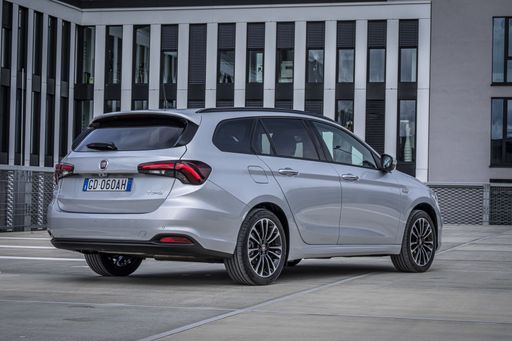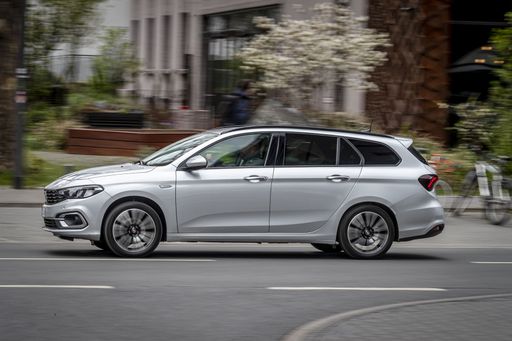Fiat Tipo Wagon vs Toyota Yaris Cross - Differences and prices compared
Costs and Efficiency:
Price and efficiency are key factors when choosing a car – and this is often where the real differences emerge.
Fiat Tipo Wagon has a to a small extent advantage in terms of price – it starts at 21000 £, while the Toyota Yaris Cross costs 23700 £. That’s a price difference of around 2700 £.
Fuel consumption also shows a difference: Toyota Yaris Cross manages with 4.50 L and is therefore hardly perceptible more efficient than the Fiat Tipo Wagon with 4.70 L. The difference is about 0.20 L per 100 km.
Engine and Performance:
Power, torque and acceleration say a lot about how a car feels on the road. This is where you see which model delivers more driving dynamics.
When it comes to engine power, the has a edge – offering compared to . That’s roughly more horsepower.
In acceleration from 0 to 100 km/h, the Fiat Tipo Wagon is a bit quicker – completing the sprint in 9.10 s, while the Toyota Yaris Cross takes 10.70 s. That’s about 1.60 s faster.
In terms of top speed, the Fiat Tipo Wagon performs slightly better – reaching 207 km/h, while the Toyota Yaris Cross tops out at 170 km/h. The difference is around 37 km/h.
Space and Everyday Use:
Beyond pure performance, interior space and usability matter most in daily life. This is where you see which car is more practical and versatile.
Seats: offers more seating capacity – vs .
In curb weight, Toyota Yaris Cross is noticeable lighter – 1180 kg compared to 1455 kg. The difference is around 275 kg.
In terms of boot space, the Fiat Tipo Wagon offers distinct more room – 550 L compared to 397 L. That’s a difference of about 153 L.
When it comes to payload, Toyota Yaris Cross barely noticeable takes the win – 510 kg compared to 475 kg. That’s a difference of about 35 kg.
Who comes out on top?
Overall, the Fiat Tipo Wagon shows itself to be is largely superior and secures the title of DriveDuel Champion.
It convinces with the more balanced overall package and proves to be the more versatile choice for everyday use.
 @ Fiat / Stellantis Media
@ Fiat / Stellantis Media
Fiat Tipo Wagon
Costs and Consumption
View detailed analysis
Engine and Performance
View detailed analysis
Dimensions and Body
View detailed analysis
Fiat Tipo Wagon
The Fiat Tipo Estate is a no-nonsense family wagon that focuses on practicality and value, with surprisingly generous load space and comfortable seats for long trips. It won't win style awards, but its sensible kit, simple controls and low running costs make it a smart, unfussy choice for buyers who want function over flash.
details @ Fiat / Stellantis Media
@ Fiat / Stellantis Media
 @ Fiat / Stellantis Media
@ Fiat / Stellantis Media
 @ Fiat / Stellantis Media
@ Fiat / Stellantis Media
Toyota Yaris Cross
The Toyota Yaris Cross takes the jaunty personality of the Yaris and gives it a taller stance and a bit more practicality, so you get city-friendly agility with added SUV presence. It’s easy to live with, economical on the daily grind, and smartly packaged — a sensible pick for buyers who want fuss-free transport with a touch of character.
details @ Toyota Motor Corporation
@ Toyota Motor Corporation
 @ Toyota Motor Corporation
@ Toyota Motor Corporation
 @ Toyota Motor Corporation
@ Toyota Motor Corporation
 @ Toyota Motor Corporation
@ Toyota Motor Corporation
 @ Toyota Motor Corporation
@ Toyota Motor Corporation
 @ Toyota Motor Corporation
@ Toyota Motor Corporation
 @ Toyota Motor Corporation
@ Toyota Motor Corporation
 @ Fiat / Stellantis Media
@ Fiat / Stellantis Media
|
 @ Toyota Motor Corporation
@ Toyota Motor Corporation
|
|
|
|
Costs and Consumption |
|
|---|---|
|
Price
21000 - 27000 £
|
Price
23700 - 34300 £
|
|
Consumption L/100km
4.7 - 5.4 L
|
Consumption L/100km
4.5 - 4.8 L
|
|
Consumption kWh/100km
-
|
Consumption kWh/100km
-
|
|
Electric Range
-
|
Electric Range
-
|
|
Battery Capacity
-
|
Battery Capacity
-
|
|
co2
122 - 125 g/km
|
co2
101 - 108 g/km
|
|
Fuel tank capacity
50 L
|
Fuel tank capacity
36 L
|
Dimensions and Body |
|
|---|---|
|
Body Type
Estate
|
Body Type
SUV
|
|
Seats
5
|
Seats
5
|
|
Doors
5
|
Doors
5
|
|
Curb weight
1455 - 1470 kg
|
Curb weight
1180 - 1290 kg
|
|
Trunk capacity
550 L
|
Trunk capacity
320 - 397 L
|
|
Length
4571 mm
|
Length
4180 mm
|
|
Width
1792 mm
|
Width
1765 mm
|
|
Height
1514 mm
|
Height
1595 mm
|
|
Max trunk capacity
-
|
Max trunk capacity
1097 L
|
|
Payload
475 kg
|
Payload
485 - 510 kg
|
Engine and Performance |
|
|---|---|
|
Engine Type
Petrol MHEV, Diesel
|
Engine Type
Full Hybrid
|
|
Transmission
Automatic, Manuel
|
Transmission
Automatic
|
|
Transmission Detail
Dual-Clutch Automatic, Manual Gearbox
|
Transmission Detail
CVT
|
|
Drive Type
Front-Wheel Drive
|
Drive Type
Front-Wheel Drive, All-Wheel Drive
|
|
Power HP
130 HP
|
Power HP
116 - 130 HP
|
|
Acceleration 0-100km/h
9.1 - 10.1 s
|
Acceleration 0-100km/h
10.7 - 11.3 s
|
|
Max Speed
206 - 207 km/h
|
Max Speed
170 km/h
|
|
Torque
240 - 320 Nm
|
Torque
-
|
|
Number of Cylinders
4
|
Number of Cylinders
3
|
|
Power kW
96 kW
|
Power kW
85 - 96 kW
|
|
Engine capacity
1469 - 1598 cm3
|
Engine capacity
1490 cm3
|
General |
|
|---|---|
|
Model Year
2024
|
Model Year
2024 - 2025
|
|
CO2 Efficiency Class
D
|
CO2 Efficiency Class
C
|
|
Brand
Fiat
|
Brand
Toyota
|
What drivetrain options does the Fiat Tipo Wagon have?
Available configurations include Front-Wheel Drive.
The prices and data displayed are estimates based on German list prices and may vary by country. This information is not legally binding.
